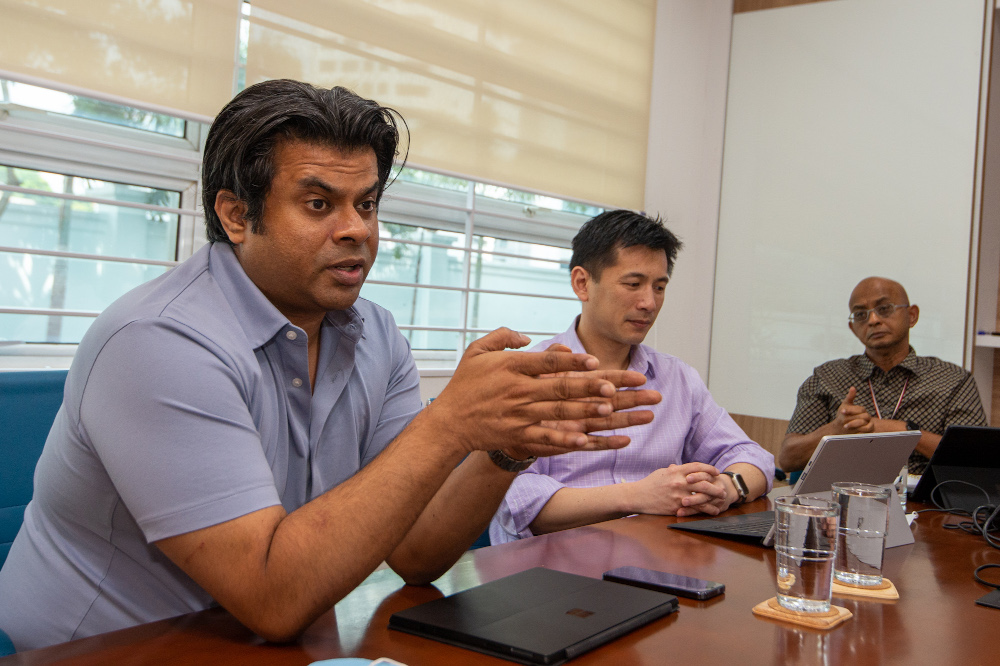KUALA LUMPUR, Nov 8 — Digital Nasional Berhad (DNB) is expected to make its 5G offering prices to mobile network operators (MNOs) public as part of its pledge for transparency, its chief operating officer Dusyan Vaithiyanathan said.
Telecommunications companies (telcos) will also pay much less per gigabyte of 5G data to DNB than what they are spending now on the existing 4G network.
This will likely translate to proportionately lower charges for consumers, who are also able to check what their operator pays for data, he explained.
“We will make public the price we’re going to offer,” Dusyan told Malay Mail.
“That way consumers will know what is the actual cost for telcos to buy 5G data.”
The Ministry of Finance’s decision to deploy 5G via a single wholesale network (SWN) system had been criticised, with detractors likening the move to a monopoly. Critics, including Opposition lawmakers, claimed some of the risks linked to the SWN approach is poorer service quality and higher 5G service prices for end-users.
However, DNB officials have repeatedly dismissed the concerns.
Under the SWN approach, the government-owned DNB will deploy Malaysia’s 5G network with equal access to MNOs. This is in contrast with the current practice where MNOs have deployed parallel 4G networks.
Dusyan, in an interview with the Malay Mail last Friday, said domestic scrutiny around SWN may be warranted because of the problems faced by countries that adopted similar systems, but he argued that most of the criticisms were inaccurate.
Among them is the claim that DNB was “riding” on infrastructure such as towers and fibre optic cables which already exist, mostly built by MNOs to deploy the 4G network.

The DNB COO said this infrastructure could be utilised to deploy 5G at a fraction of the cost of building new ones — by leasing them. He said MNOs will actually be getting revenue from the leasing of their existing towers and fibre optic cables.
“RM7.5 billion of our actual total cost are actually going back to the MNOs… through rental and leasing of towers and fibres,” said Dusyan, explaining that operators will be earning from DNB leasing their infrastructure.
“I always tell the telcos you can keep complaining but if you take the deal and you can give us a good rate so we can keep our cost down then net-net your price to serve 5G is even less,” he added.
Pricing of 5G data for MNOs and the ensuing cost to provide the technology to end-users has been at the centre of the controversy around DNB’s single network distributary approach.
GSMA, a global association representing private network operators, claimed in an audit by the London-based consultancy DT Economics there had been concerns over a supposed lack of clarity around how DNB plans to price the spectrum and vague regulation.
Ralph Marshall, DNB’s chief executive officer, was quoted by The Star as saying that the special purpose vehicle will only focus on cost recovery. DNB had repeatedly stressed that it is a “neutral wholesale provider” mandated by the government to keep the cost of 5G rollout as cheap as possible.
The state-owned firm is expected to utilise a multi-operator core network (MOCN), which it said will help maximise efficiency. Dusyan said the model was among the strategies identified to help DNB achieve its mandate, with an estimated total cost of just RM8 billion.

DNB’s total cost estimation to build and deploy 5G in the country will be around RM16 billion, but The Star had quoted Marshall as saying that the cost could inflate to RM20 billion by 2030 as demand surges. It would have cost private companies up to RM30 billion to build the infrastructure, he suggested.
MOCN is considered to be the most resource efficient solution as it gives mobile operators the opportunity to pool their respective spectrum allocations, resulting in improved trunking efficiency.
DNB says its plans will allow them to offer 5G per gigabyte to MNOs at less than the cost of providing 4G at the same size, which means consumers can expect to pay less for super-speed internet.
Wholesale pricing remained confidential at the moment as engagement with MNOs continues, but Dusyan said operators and consumers could expect to pay “significantly” cheaper for the technology.
“We estimate the cost will be significantly cheaper to get 5G per GB than it will be to get 4G,” Dusyan said.
A UBS Research forecast suggested the 5G wholesale price could be as low as 50 sen per GB, lower than the existing network cost of RM1.10 per GB.
The MOCN approach will also enable DNB to roll out 5G quicker than it did to deploy 4G. Most MNOs had struggled to improve their 4G coverage, likely because of the massive cost it takes to upgrade the infrastructure.
“That was another design principle that we had and that’s because we as DNB had that mandate. Now as a commercial entity will they have rolled out as fast? Probably not,” he said.
Despite claims that open competition will encourage MNOs to provide faster internet service, data suggests 4G services have been deteriorating as data consumption grew on the back of cheaper mobile internet.
Maxis, one of the leading telecommunications operators, took six years to reach 80 per cent coverage for 4G, from the launch in January 2013, according to government data.
Download speeds of both Maxis and Celcom have also fallen sharply over the past year as the Covid-19 pandemic kept people indoors and forced them to consume more data.
DNB has pledged that its first commercial 5G service launch in December 2021 (in Kuala Lumpur, Putrajaya and Cyberjaya) will achieve 80 per cent population coverage by 2024.



















